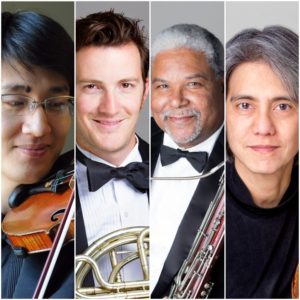
The Ring in San Francisco – Orchestra Members on Performing Wagner’s Magnus Opus
By Lois SilversteinSan Francisco Opera is in the midst of its month-long festival dedicated to Wagner’s “Ring Cycle.” In the coming weeks, Lois Silverstein will explore her experience not only revisiting the 2018 opera production, but several of the events and panels presented by the company.
San Francisco Opera Director Matthew Shilvock moderated an excellent panel on the World of the “Ring” orchestra. Getting the perspective of playing the glorious score of this cycle of four operas was illuminating and filled out a dimension we have longed to hear.
Rufus Olivier (Principal Bassoon), Kevin Rivard (Co-Principal Horn), Thalia Moore (Associate Principal Cello), and Dian Zhang (First Violin), were the four orchestra members who shared some of their experiences with Shilvock, including their initial exposure and experience with Wagner before their San Francisco Opera Orchestra tenure and during, in particular, this hefty musical collaboration from 2018.
Each of the musicians expressed strong affiliation with the music and the commitment to undertake a lengthy preparation before playing the score. Moore rode the Greyhound Bus from the East Coast playing the cassettes of the “Ring” back in the 80s, when she came out to audition for the orchestra. Olivier said he didn’t realize the depth and breadth of the music when he first signed on, also in the 80s. Once Rivard and Zhang took up the challenge, Zhang described the process as one of demystification of the awe of doing it, somewhat like climbing Mt. Everest, Rivard distinguishing it from the familiar tunefulness of the main horn leitmotifs and digging deep into the full music of the score. He said he prepared for one full year before he even started with the orchestral rehearsal process.
For all, stamina was, from the outset, a necessary challenge. While the singers, of course, have a 16-hour performance to output, most of them have some sort of pause over its course. But that’s not the case for the musicians who must play the whole time. As Olivier stated, Even though you might be “gung-ho” when you start out from “Das Rheingold,” for instance, you have to monitor your enthusiasm if you’re going to get through the whole thing. You want the audience to feel the excitement but you can’t stay at that intensity throughout. Therefore, you must moderate your own excitement and monitor parts where you pull out the throttle and other times when you play at a lower intensity. The three others absolutely agreed.
“It is epic,” Rivard said, “and because I love it so much, I have to make sure I don’t go on empty because I over-emphasize one part too soon.”
It is unlike anything else he has played – he needs to give 100 percent over the whole performance.
Each spoke of the masterful writing of the music. Moore spoke of the extraordinary depth, variety, and quality of the music for the cello that Wagner created.
“His music is rewarding to play,” she said, “especially in its idiomatic passages.”
Zhang spoke of how he learned to work with the gesture of the notes to create the texture that Wagner wanted, working with his particular string section to produce appropriate color, not too heavy or too light. It is essential, he said, to keep a concentrated but to play it lightly.
Olivier emphasized how he grew in his appreciation of the music has grown extensively as he has played in various San Francisco Opera Ring productions between 1985 and 2018. He loves playing the Basson in the middle of the orchestra, his highly talented colleagues all around; it makes the hairs on the back of his neck stand on end. Moore too has grown in her plumbing of the depth of the music. She values the immensity of the masterpiece. “You never get to the bottom of it.”
The veritable crowd of musicians huddled in the Pit requires a bit of maneuvering, Zhang pointed out, especially since he is tall, and has to “wield” his bow. He doesn’t mind, he said. The work brings everyone together mentally and spiritually. Olivier said it was a little like the Blue Angels in formation in the sky. “We always have to do some wiggling, but, the result? Smooth and satisfying.”
As Shilvock pointed out, Wagner wanted robust colors in his orchestra, but did not want to cover the singers.
Each of the musicians praised Sir Donald Runnicles for his special command of the score. He has a big picture approach, but is very astute in each detail. Rivard said too that because Runnicles is a horn player himself, he knows precisely how to phrase the horn parts. He also is not at all averse to letting us play, as well as keeping us working on the big picture. It is an easy conversation between us as musicians and his conducting leadership. Olivier adds, “Sir Donald uses us for what we were hired for.”
As for what’s going on with the singers on stage, Olivier says he hasn’t seen what is going on there since 1995! Several comments followed about whether that was essential to the musicians. Consensus was that following their fellow musicians, Runnicles and the score, was more than enough, especially since the professional performance “up there” was well under control. It was an informative and lively conversation over-all.
Categories
Special Features

